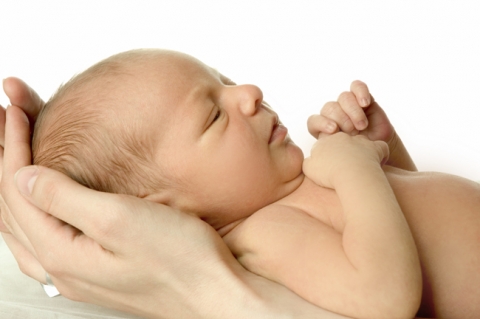Better Birth
A Good Birth: Finding the Positive and Profound in Your Childbirth Experience. By Anne Drapkin Lyerly. Avery, 288 pages, $26.00.
by Susan Hardy
What is a “good” birth? UNC’s Anne Lyerly asked 101 women.
In medical school, Lyerly had learned that all that mattered in birth was keeping the mother and baby safe. This approach never sat quite right with her—what about the mother’s experience of birth?
But when she looked to the midwifery movement for another point of view, she found a deep skepticism about technology that she didn’t agree with either. “If a good birth is a natural birth,” she says, “then that leaves out a lot of women who are physiologically unable to have that kind of birth.”
Women today, Lyerly writes in A Good Birth, are caught between the traditions of the medical community on one side and the hard-to-meet standards of natural birth on the other. She’s seen this division as an obstetrician who has attended hundreds of births, but also as a mother who felt let down after having a cesarean section.
“The birth of a child is among life’s most memorable experiences,” she writes. “That those memories are imbued with regret or uncertainty because of the way our culturetalks and thinks about birth—the way doctors and midwives and women themselves squabble about it—is something I’m determined to change.”
That determination became the Good Birth Project: a research study and a book that define a “good” birth not by which medical interventions a woman does or doesn’t have, but by how the woman participates in and feels about the process.
To find out what makes a good birth, Lyerly and anthropologist Emily Namey talked to 101 mothers from different backgrounds and a variety of birth experiences. Some of the women were pregnant for the first time and talked to Lyerly or Namey before and after giving birth; others had already given birth several times. What made their birth experiences good or bad? What did they want to do differently next time?
What struck Lyerly about their stories was how two women could have similar expectations and births, yet come away with completely different views of how things went. She uses the examples of “Wren” and “Liz,” two women who had planned to give birth in hospitals and get epidurals:
As it turned out, neither Wren nor Liz got the epidural they wanted, though each requested one (repeatedly) on arrival at the hospital … Both ultimately delivered their babies before an epidural could be placed. For Wren, the unexpected turn of events was “extremely positive … fabulous.” Liz, though, assessed her birth overall as “very negative” and was “extremely disappointed in the whole hospital.”
The main difference, Lyerly found, was that Wren felt supported by the nurses and others who assisted her, while Liz felt alone, uninformed, and even lied to about what was going on.
From these stories and many others throughout the book, Lyerly pulled five things that seem to matter more in women’s birth experiences than whether the birth went according to plan: agency, personal security, connectedness, respect, and knowledge. A woman can find these in any type of birth experience, she says. “The things that a woman who had a home birth said she valued could be the very things that a woman who had an elective cesarean said she valued.”
A Good Birth suggests ways to promote these five values in birth—for example, a woman can retain agency if she’s allowed to choose who touches her and when. And physicians can maintain respect for birth, Lyerly writes, by being careful to talk about babies and mothers as people rather than as interesting medical cases.
Lyerly wrote A Good Birth both for women who haven’t had a baby yet and for women who want to find meaning in births that didn’t go quite according to plan. “You might find out what a good birth looks like to you,” she suggests, “by seeing what it looks like to a vast array of other women.”
Preparing for a good birth
UNC obstetrician Anne Lyerly’s advice for expecting mothers, whether you’re giving birth at home or in a hospital:
- Find a provider you connect with. For those who have an opportunity to choose, Lyerly says to look for a provider with whom you feel a connection. “It’s not just about the doctor or midwife,” she writes, “but how you relate to each other.”
- Keep a journal about your hopes and fears for birth.During her own pregnancies, Lyerly kept a journal to help her understand and manage her feelings and worries.
- Accept the loss of some control. Lyerly says that a lot of women who like to plan and be in control find the experience of giving birth—which defies all control—surprisingly wonderful.
- Learn. No one can know everything about birth, but it does help to learn about your body in advance. “One woman I talked to was really glad she’d read about vernix,” Lyerly says. “If she hadn’t, when her baby came out covered with all this white stuff, she would have thought something was really wrong.”
Anne Lyerly is an associate professor of social medicine and an adjunct associate professor of obstetrics and gynecology in theUNC School of Medicine. She’s also the associate director of UNC’sCenter for Bioethics. Emily Namey, now a senior research associate at FHI 360, worked on the Good Birth Project as an interviewer and clinical research coordinator for Duke University Medical Center.


{ 0 comments… add one now }